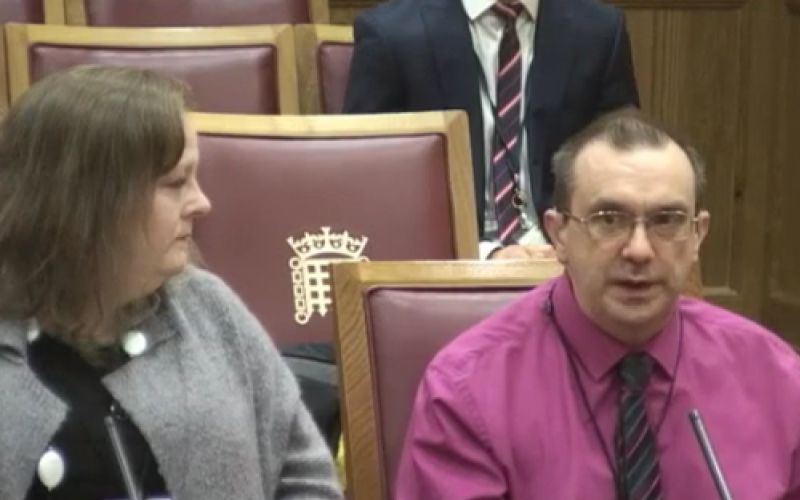Two couples who have taken disability discrimination cases through the legal system have told a committee of peers about the barriers they have faced in trying to secure justice.
Michèle and Andrew Brenton, and Jeanine and David Blamires, had been asked to give evidence in person to the Equality Act 2010 and disability committee, set up by the House of Lords to examine the impact of the act on disabled people.
Andrew Brenton (pictured, giving evidence, watched by his wife) told the committee that it was not possible to secure legal aid for discrimination cases, while the rules on taking civil cases through the courts were “really complicated”.
His case against University of Wales Trinity Saint David – which ended with him being awarded £20,000 in compensation – was reported by Disability News Service three months ago.
The university had built a library it knew was inaccessible in order to cut costs, and then barred Brenton and other mobility-impaired students from the basement floor for more than four months after he reported concerns about fire safety practices when a lift broke down.
He told peers on the committee that the university had hired expensive lawyers to fight the case, and their first action had been to try to “frighten” him by warning he had made a series of mistakes in filing his civil claim, which meant he would eventually have to pay their £65,000 costs.
Even though he had been receiving disabled students’ allowance and disability living allowance – at the middle rate care and higher rate mobility – the university’s lawyers also tried to prove that he was not disabled.
He said: “It just adds a further layer of harm. It’s very, very, very distressing.”
Despite the legal ordeal and his eventual victory, he said the university had only “paid lip service to changing” since his case was concluded.
He said: “They say they have changed, they say they have rewritten some of their equality policies.
“I have it from an extremely reliable source that students are still being discriminated against.
“One of the university’s newest buildings, I have it on authority, is not wheelchair-accessible in the way it should be.
“My son [currently a student at the university] is still being discriminated against as regards his neurodiversity and his learning difficulties, so it is still going on.”
Jeanine Blamires told the committee that the judicial system itself was a barrier to justice for disabled people.
She said: “The judicial process isn’t bound by the Equality Act. It needs to be.
“All parts of the court process must come under the Equality Act. Must. So you know that once you hit the court process you are safe from discrimination, and at the moment you’re not.”
She highlighted the difficulty of obtaining accessible advocacy, and said there was no funding to support advocacy organisations to take on complex cases.
She also claimed that the legal aid system ignored complex civil cases because they were too expensive, while her husband criticised the ombudsman system for its failure to make reasonable adjustments for disabled people who make complaints.

 Peers criticise government for ‘objectionable’ Equality Act failure
Peers criticise government for ‘objectionable’ Equality Act failure Court awards disabled woman ‘aggravated’ damages for ombudsman discrimination
Court awards disabled woman ‘aggravated’ damages for ombudsman discrimination Lib Dem conference: Party ‘needs to rebuild trust with disabled voters’
Lib Dem conference: Party ‘needs to rebuild trust with disabled voters’